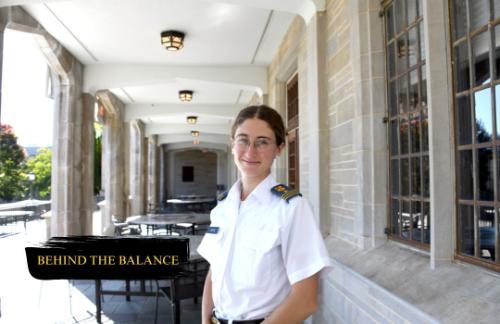Behind the Balance: Gretal Shank ’25 — Keydet Cross Country
Virginia Military Institute’s cadet-athletes have to juggle cadet life, heavy academic course loads, and their NCAA Division I sport. Committed to both academic and athletic pursuits, balancing their rigorous schedule in both sports and school requires a certain level of commitment and discipline. Behind the Balance is a series that focuses on those cadet-athletes and how they handle the hurdles of the day-to-day.
LEXINGTON, Va. Sept. 23, 2024 — Gretal Shank ’25 started running cross country when she was in seventh grade. She almost quit two weeks in. 
“I didn't like it,” she admitted. “It was hard, but then I realized I was pretty good at it, so I stuck with it and did it all through high school. I did pretty well, I’m still running.”
She averages running 30 to 40 miles a week. During that time, she treats it as meditation. Shank, an English major, says she spends her runs sometimes formulating stories.
“I'm also a writer. I do a lot of my thinking about ideas for what I'm going to write, while I run, also just ideas for anything,” she said. “I got a lot of time on my hands.”
During the harder workouts, though, she’s not thinking about anything.
“I think a big part of it is mental. It gives me a mental break in the middle of the day. I get a lot of my thinking done while I'm running,” she said. “Also, it keeps me fit, obviously. It gives me goals to work on, from personal goals to team-oriented goals. A big aspect of that is teamwork, but it's also an individual sport.” .png)
She applied to West Point, but didn’t get in, so she shifted to VMI. Without even seeing post first, she decided to commit. It took one call to the cross country coach for her to get on the team with a partial scholarship.
“I wanted a college experience that wasn't going to be ordinary,” Shank said. “But it initially started whenever I was looking into commissioning, because my parents are both in the military.”
With plans of commissioning into the U.S. Army, Shank’s days are filled and regimented — much like other cadets at VMI. The schedule she keeps ensures she’s able to get all her tasks done. On top of a sport, she’s taken a heavy credit load her entire time at VMI — taking 20 credits this semester, three of which are dedicated to her honor’s thesis. Due to her psychology minor, she must tack on six more classes to fulfill requirements.
Her academic schedule is packed. Mondays, Wednesdays, and Fridays, she has five or six classes, then heads to practice from 3:30 to 7 p.m. Tuesdays and Thursdays, she has Army ROTC lab and classes.
Cadet-athletes at VMI not only have their responsibilities with their selected sport but cadet duties on top of that. Cadets are also required to take physical fitness classes twice a week, participate in ROTC all four years, prepare for room and uniform inspections, practice for parade, guard duty, and more.
The continuous activity is something Shank likes. Besides being a DI athlete and having cadet responsibilities, she’s the visual editor for Cadence, the Institute’s fine arts publication. She also works at the VMI Writing Center and is the president of Sigma Tau Delta, the International English Honor Society. 
"I think for me, it might make it easier. I haven't known any different, but I think it's easier because I have a consistent schedule,” she said.
Each day has a specific schedule that Shank doesn’t deter from. When it comes to a slower day or a day off, she often doesn’t know what to do with herself. She needs constant activity to push her along.
“I find that on days that I don’t have practice, which is pretty rare, I actually don't get more work done,” she said.
VMI has kept her busy and helped create a lifestyle of structure, she said. She needs to have a designated time for everything, otherwise she’d get nothing done.
"Honestly, the busier I am, the more I will be able to get done, because otherwise it's easier for me to just be lazy,” she admitted. "I've kind of run into that problem on Tuesdays and Thursdays a little bit to where I just kind of want to relax, because my Monday, Wednesday, Fridays are so busy, but it's been fun. I've gotten all the work done that I need to get done, so that's what matters.”
Laura Peters Shapiro
Communications & Marketing
VIRGINIA MILITARY INSTITUTE
.svg)
.png)